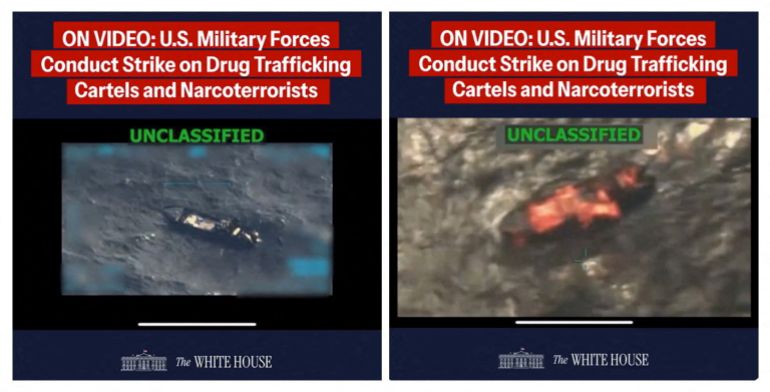Washington, DC – Dozens of United States-based human rights, faith and policy groups have criticised President Donald Trump’s expansion of military operations in the Caribbean, warning that his administration’s new campaign could result in “a full-blown limitless war with one or more countries in the region”.
In a letter written to Congress on Wednesday, the signatories condemned a series of recent US strikes on boats in the Caribbean, including at least three originating from Venezuela, that have killed more than 20 people since September. The strikes are the first lethal US military operations in the Caribbean in decades, part of what the Trump administration calls a fight against “narcoterrorism”.
Recommended Stories
list of 3 itemsend of list
“The Trump administration has not provided any valid legal justification for these strikes or any evidence to substantiate its claims that the victims were an imminent threat to the security of the United States,” the letter said.
Signed by nearly 60 organisations – including Oxfam America, Human Rights First, Maryknoll Office for Global Concerns and the American Friends Service Committee – the letter called on members of Congress to block what it described as unauthorised and illegal uses of force.
“We fear, barring decisive action by members of Congress, there will be more strikes, more extrajudicial killings, and potentially a full-blown limitless war with one or more countries in the region, with likely devastating humanitarian and geopolitical consequences,” the letter said.
The appeal was issued before a War Powers Resolution introduced by Senators Tim Kaine and Adam Schiff was expected to reach the Senate floor on Wednesday. Schiff said he and Kaine will force a vote to block the government from carrying out lethal strikes against vessels in the Caribbean.
“If a president can unilaterally put people or groups on a list and kill them, there is no meaningful limit to his use of force,” Schiff said.
The measure seeks to halt unauthorised US military activity in the Caribbean and reassert Congress’s authority over the use of force.
Escalation and legal concerns
The New York Times reported in July that Trump signed a secret directive authorising the possibility of “direct military operations at sea and on foreign soil against cartels”.
Within weeks, US Navy warships and aircraft and more than 4,000 soldiers were deployed to the southern Caribbean. Two weeks later, the first of four strikes occurred.
To justify the escalation, the administration labelled certain regional groups like Venezuela’s Tren de Aragua gang as “foreign terrorist organisations” and “specially designated global terrorists”. However, legal experts noted these designations do not authorise the use of military force overseas.
Administration officials have defended the escalation as a counternarcotics mission, insisting that the targeted vessels were linked to drug trafficking and “terrorist organisations”.
But according to the Washington Office on Latin America and the UN Office on Drugs and Crime, about 90 percent of US-bound cocaine transits the eastern Pacific and western Caribbean, not near Venezuela’s coast. The Drug Enforcement Agency likewise reported that fentanyl entering the US is produced in Mexico using precursor chemicals from China, not Venezuela.
At the Naval Station Norfolk in Virginia this week, Trump told reporters that if traffickers “aren’t coming by sea any more”, US forces might “move the fight onto land”.
Regime change fears
As the administration’s rhetoric has increasingly blurred the line between targeting drug traffickers and targeting the Venezuelan state itself, civil society groups are arguing that the strikes are part of a broader strategy aimed at regime change in Venezuela. US Secretary of State Marco Rubio, who has long advocated for regime change there, has referred to Venezuelan President Nicolas Maduro’s government as a cartel “masquerading as a government” and branded him a fugitive from US justice, offering up to a $50m reward for his capture.
However, internal documents obtained by the Freedom of the Press Foundation confirmed that US intelligence agencies acknowledged Maduro’s government is “not directing [Venezuela’s] Tren de Aragua’s operations in the United States”.
Alex Main, director of international policy of the Center for Economic and Policy Research, warned that Trump’s campaign “could soon be directed at Venezuela in an attempt to incite violent regime change” and other countries, such as Mexico or Panama, could also face US intervention with “potentially disastrous consequences” for the region.
Democrats on the Foreign Affairs Committee in the House of Representatives have also stated that “Trump and Rubio are pushing for regime change in Venezuela,” adding: “The American people don’t want another war – and Congress can’t let any president start one illegally or unilaterally. That’s not how the Constitution works.”
Elizabeth Tregaskis Gordon, senior policy advisor for LAC at Oxfam America, told Al Jazeera that many Venezuelans are already “living through crisis” and warned that an increase in US military would disrupt humanitarian work in the country.
“Many cannot access basic necessities to survive, while they face rising prices for consumer goods and increasing food insecurity,” she said. “Worsening of the humanitarian crisis will only lead to more chaos and disruption; current US military action is unconstitutional, violates the UN charter, and should cease immediately. ”
Faith communities take a stand
“War is always a defeat,” Susan Gunn, director of the Maryknoll Office for Global Concerns, told Al Jazeera. “When such killing is aimed at civilians with no due process, it violates the sacredness of human life and undermines basic human rights and the rule of law.”
The letter her group and others wrote to Congress also warns that further escalation could worsen Latin America’s largest modern displacement crisis, deepening the suffering of millions of people who have already fled Venezuela.
The signatories urged Congress to reverse the military build-up, investigate civilian deaths and pursue diplomacy.
The Friends Committee on National Legislation’s general secretary, Bridget Moix, added: “War is not the answer at home or abroad.”
Source: Aljazeera

Leave a Reply